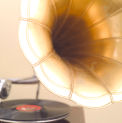The Battle Hymn of the Republic (U.S. Army Band)

Features the U.S. Army Chorus.
Composer:
Steffe, William
Arranger:
Wilhousky
Lyricist:
Howe, Julia Ward
Performer:
U.S. Army Band
Taken from cd entitled: "The flag flies high."
The Battle Hymn of the Republic" went through a number of versions in
the years immediately before the Civil War. Its tune and its early
lyrics were written by William Steffe about 1856. Its first verse and
refrain were as shown below.
The Battle Hymn of the Republic
 Listen -- MP3
Listen -- MP3
 Listen -- MP3 (Thomas Chalmers)
Listen -- MP3 (Thomas Chalmers)
 Listen -- MP3 (U.S. Marine Band)
Listen -- MP3 (U.S. Marine Band)
 Listen -- MP3 (U.S. Air Force)
Listen -- MP3 (U.S. Air Force)
Mine eyes have seen the glory of the coming of the Lord He is trampling out the vintage where the grapes of wrath are stored . . . Say brothers, will you meet us?
Say brothers, will you meet us?
Say brothers, will you meet us?
On Canaan's happy shore?
Glory, glory hallelujah!
Glory, glory hallelujah!
Glory, glory hallelujah!
For ever, evermore!
The song first gained popularity around Charleston, South Carolina, where it was sung as a Methodist Camp Meeting song, particularly in churches belonging to free Blacks. By contrast, it was also used early on as a marching song on army posts.
The song gathered new verses following the insurrection at Harper's Ferry, led by John Brown and carried out by a cadre of nineteen men on October 16, 1859. Brown's actions, trial and subsequent execution made him a martyr to Abolitionists and African-Americans and prompted some people to add the following lines to Steffe's by then popular song.
John Brown's body lies a-mouldering in the grave,
John Brown's body lies a-mouldering in the grave,
John Brown's body lies a-mouldering in the grave,
His soul is marching on!
Some have also theorized that the new verses were written about an inept Army sergeant named John Brown, thus giving the lyrics a kind of humorous double entendre.
By the time of the Civil War "John Brown's Body" had become a very popular marching song with Union Army regiments, particularly among the Colored troops. The Twelfth Massachusetts Regiment, in particular, has been credited with spreading the song's fame on their march to the South, where Confederate soldiers then inverted the meaning of their words and sang, "John Brown's a-hanging on a sour apple tree." The war's rivalry continued to be carried on in music as the northerners then sang in turn, "They will hang Jeff Davis to a sour apple tree."
But it was when Julia Ward Howe visited Washington, DC in 1861 that the tune properly came to be called "The Battle Hymn of the Republic." Howe and her husband, both of whom were active abolitionists, experienced first-hand a skirmish between Confederate and Union troops in nearby Virginia, and heard the troops go into battle singing "John Brown's Body." That evening, November 18, 1861, Ward was inspired to write a poem that better fit the music. It began "Mine eyes have seen the glory of the coming of the Lord." Her poem, which was published in the Atlantic Monthly in February 1862 soon became the song known as "The Battle Hymn of the Republic."
Mine eyes have seen the glory of the coming of the Lord He is trampling out the vintage where the grapes of wrath are stored, He has loosed the fateful lightning of His terrible swift sword His truth is marching on. Chorus: Glory! Glory! Hallelujah! Glory! Glory! Hallelujah! Glory! Glory! Hallelujah! His truth is marching on. I have seen Him in the watch-fires of a hundred circling camps They have builded Him an altar in the evening dews and damps I can read His righteous sentence by the dim and flaring lamps His day is marching on.
Chorus
I have read a fiery gospel writ in burnish`d rows of steel, "As ye deal with my contemnors, so with you my grace shall deal;" Let the Hero, born of woman, crush the serpent with his heel Since God is marching on.
Chorus
He has sounded from the trumpet that shall never call retreat He is sifting out the hearts of men before His judgment-seat Oh, be swift, my soul, to answer Him! Be jubilant, my feet! Our God is marching on.
Chorus
In the beauty of the lilies Christ was born across the sea, With a glory in His bosom that transfigures you and me: As He died to make men holy, let us die to make men free, While God is marching on.
